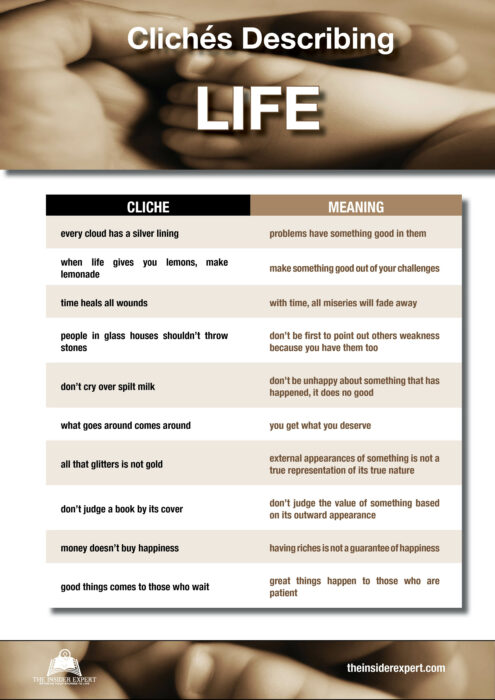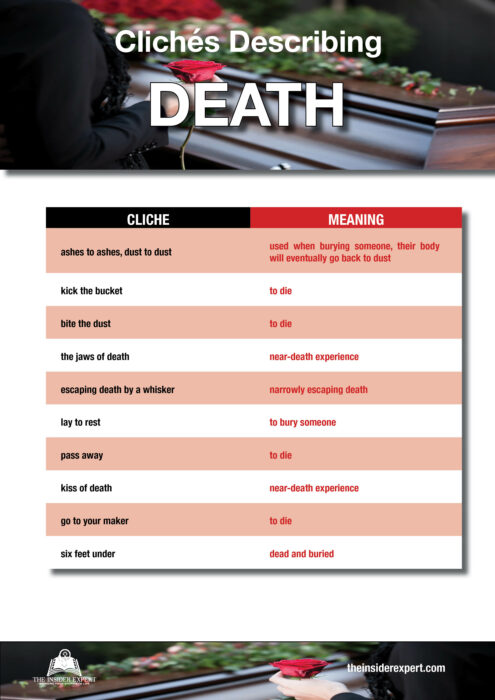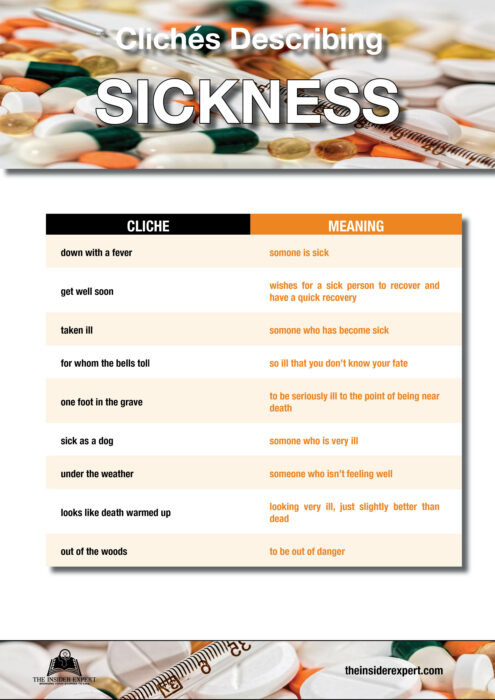SAMPLING FROM: How to use CLICHES and SLANG effectively

This is a sampling of the content in How to use CLICHES and SLANG effectively (M1-S417)
TOPIC: How to recognise Physical CLICHES
Clichés. They are familiar to all of us. Without a doubt, we have all made use of them. Clichés can be used in certain situations, but they are not always appropriate. Because they have the potential to irritate the reader, you must be mindful of when to avoid using them. However, when used correctly, it can simplify difficult phrases and situations, making them easier to understand.
-
For fiction writers, clichés work best in dialogue, inner thoughts, or tonal effects and can be twisted for originality.
-
For non-fiction writers, clichés are most effective in introductions, cultural commentary, or human stories, but must be used sparingly and with care to preserve credibility.
In this lesson, we will present examples of each of the following types of clichés that pertain to the physical world:
- Clichés describing Life
- Clichés describing Death
- Clichés describing Sickness
What are Physical Clichés
Clichés about life, death, and sickness are conventional, widely used ways of putting words to the most profound human experiences. They persist because they are comforting, accessible, and easily understood, even though their overuse can flatten meaning and reduce originality in writing.
Clichés that pertain to the physical world are familiar phrases or expressions used to describe fundamental aspects of human existence, such as being alive, facing death, or experiencing illness. They are born out of shared cultural attempts to put words to experiences that are both universal and deeply emotional. Over time, these expressions become so common that they lose their originality, yet they remain powerful because they are instantly understood and recognised by readers.
These are well-worn ways of talking about the nature of living itself. They tend to emphasise cycles, journeys, or the unpredictability of existence. Such clichés emerge because people often reach for simple, memorable phrases to capture something vast and complex — the meaning of life, its brevity, or its ongoing nature. They are rooted in everyday conversation, storytelling, and cultural wisdom, giving writers ready-made shorthand for concepts that might otherwise take pages to explain.
Death is difficult to confront directly, so societies create soft, familiar language to express it. Clichés about death often act as a form of comfort, easing the harshness of finality with gentler or metaphorical phrasing. They reduce emotional weight into something manageable, helping people acknowledge loss without being overwhelmed by it. In writing, they are a quick way of signalling the fact of death while also reflecting cultural or spiritual attitudes about what it means.
Clichés around sickness are ways of making illness easier to discuss or more vivid in everyday speech. They often rely on metaphors or simplified images that turn the complex, often frightening experience of being unwell into something familiar and understandable. These expressions help people express sympathy, describe physical states, or convey resilience, but they can also strip away nuance, making illness feel like a stock condition rather than a lived reality.
-
They provide a shared vocabulary for experiences everyone encounters.
-
They serve as emotional shorthand, offering quick recognition and understanding.
-
They reflect cultural beliefs and attitudes towards life’s biggest realities.
-
They act as coping mechanisms, softening painful truths through familiar phrasing.
Clichés for Fiction Writers
-
Recognising clichés – Familiar phrases about life (“the circle of life”), death (“passed away”), or sickness (“fighting a battle”) are deeply ingrained in how people speak and instantly recognisable to readers. Understanding them helps a fiction writer avoid unoriginal language that dulls emotional impact.
-
Reworking clichés – By knowing the common expressions, writers can subvert them, twist them, or refresh them to surprise readers and add originality.
-
Character authenticity – In dialogue or inner thought, clichés can reflect how people really speak, grounding characters in believable patterns of speech, particularly when emotion makes them fall back on familiar phrases.
-
Emotional shorthand – Sometimes a cliché can efficiently convey feeling, especially in high-stakes moments where brevity feels true to life.
-
Tone and style control – Choosing whether to embrace or reject clichés allows the writer to shape the tone—warm, ironic, tragic, or satirical—depending on the story’s needs.
- Dialogue: Characters often resort to clichés when speaking in grief, sickness, or reflection, because people naturally fall back on familiar language in raw emotional moments.
- Inner monologue: A cliché may surface in a character’s thoughts, showing how they have absorbed cultural ways of describing life and death.
- Tone-setting: A cliché can work if it matches the voice of the story (e.g. sentimental, ironic, satirical).
- Genre expectations: Certain genres (romance, family sagas, cosy mysteries) often tolerate clichés more in emotional description than others (literary fiction, experimental writing).
- Twist or subversion: Writers can introduce a cliché only to undercut it with irony or replace it with a more startling truth, adding originality.
- Overusing narration makes the prose predictable, but when used sparingly and strategically, clichés can lend authenticity and emotional truth.
- Fiction writers use clichés in character voice, narration, and tone.
Clichés for Non Fiction Writers
- Clarity and accessibility – Clichés about life, death, and sickness are widely understood, making them a simple way to connect with readers on sensitive subjects.
- Cultural resonance – These phrases reflect shared cultural ways of processing universal experiences; using them can show awareness of how people talk and think.
- Empathy and sensitivity – When writing about death or illness, clichés can soften difficult realities, making the writing more approachable for general audiences.
- Risk of overuse – However, relying too heavily on clichés may come across as lazy, imprecise, or lacking authority in non-fiction, so awareness helps writers know when to use them sparingly.
- Reframing for impact – By understanding clichés, non-fiction writers can acknowledge them, then reframe or replace them with fresher, more precise expressions that carry greater weight for readers.
-
Introductions & hooks: A cliché may work as a familiar entry point before the writer reframes or challenges it with evidence or a new perspective.
-
Case studies or anecdotes: When quoting or retelling how people actually speak about illness or loss, clichés can preserve authenticity and humanity.
-
Explaining cultural attitudes: In history, sociology, or psychology, clichés reveal how societies have described life and mortality and can be examined as cultural artefacts.
-
Self-help or memoir: Using familiar phrases can comfort readers facing illness or grief, but they should be paired with honest, specific insights.
-
Conclusions: A reframed cliché can make a closing remark feel resonant, provided it has been earned by the depth of the book.
- In non-fiction, clichés should not replace analysis. They work best as points of connection, softened truths, or cultural illustrations, but should always be followed by depth and clarity.
-
Non-fiction writers use cliches to balance accessibility, credibility, and cultural sensitivity.
Questions to Ask Yourself that May Help

Questions for Fiction Writers for Clichés on Life, Death, Sickness
- Do the clichés about life I use sound fresh in my character’s voice?
- Am I relying on clichés instead of showing life through action and detail?
- Does the phrase suit the personality, age, or culture of the character?
- Could I twist or subvert the cliché to surprise the reader?
- Does using a cliché help create authenticity in dialogue?
- Am I overusing clichés in narration where originality matters more?
- Does the cliché reflect the story’s theme or just fill space?
- Could I replace the cliché with a vivid image or symbol instead?
- Does the cliché add warmth and relatability to a scene?
- Am I aware of the cultural or historical roots of the cliché?
- Is the phrase being used sincerely or with irony?
- Would this cliché make my reader feel patronised?
- Does the cliché reinforce stereotypes about life’s meaning or purpose?
- Could a fresh metaphor make the scene more memorable?
- Does the cliché weaken the emotional impact of a key moment?
- Am I using it to avoid tackling a complex idea head-on?
- Does the cliché help or hinder pacing at this point in the story?
-
Do clichés about death sound true to my characters’ emotions?
-
Am I using them in dialogue (where natural) or narration (where lazy)?
-
Does the phrase soften the reality of death too much?
-
Could the cliché diminish the seriousness of loss?
-
Does it add comfort or come across as sentimental?
-
Would it feel hollow to readers who have experienced grief?
-
Could I show grief through reactions rather than stock phrases?
-
Does the cliché match the cultural background of the character?
-
Am I repeating a phrase readers have heard countless times?
-
Does the phrase carry the weight of the story’s tone?
-
Could I twist or challenge the cliché to create new meaning?
-
Am I using it as a shield to avoid writing raw emotion?
-
Does it move the story forward or stall it?
-
Does it reinforce cultural taboos about talking openly about death?
-
Would stripping away the cliché make the moment more powerful?
-
Does the cliché highlight the theme of mortality or water it down?
-
Am I allowing the cliché to stand in for genuine character development?
- Do clichés about sickness sound authentic in the character’s mouth?
- Does the metaphor (battle, struggle, etc.) fit the character’s worldview?
- Could it trivialise the seriousness of illness?
- Does the cliché reduce a unique condition into a stock phrase?
- Am I using the cliché to connect with readers quickly or to avoid detail?
- Does it feel natural in dialogue but tired in narration?
- Does it reflect the culture or society of my fictional world?
- Could I use sensory description instead of leaning on cliché?
- Does the cliché reinforce stereotypes about courage or frailty?
- Does it distract from the deeper emotional experience of illness?
- Is the cliché necessary to show realism, or can it be cut?
- Could it be twisted for irony or satire, depending on the tone?
- Does the phrase highlight resilience or reduce the character to a trope?
- Am I using it because readers expect it, or because it fits organically?
- Would a more original description make the scene stronger?
- Does the cliché undermine or strengthen empathy for the character?
Questions for Non-Fiction Writers for Clichés on Life, Death, Sickness
- Am I using clichés about life as a shortcut instead of giving depth?
- Does the phrase connect with readers, or risk sounding tired?
- Do I explain or challenge the cliché rather than just repeat it?
- Am I aware of cultural differences in how life is described?
- Does the cliché simplify a complex idea too much?
- Could I replace the cliché with evidence, detail, or a story?
- Does the phrase align with the purpose and tone of my book?
- Am I using it in an introduction as a hook or throughout?
- Does the cliché distract from the originality of my argument?
- Is the cliché relevant to my topic, or is it just filler?
- Am I leaning on cliché because I lack clarity in my ideas?
- Could I analyse the cliché itself to reveal cultural attitudes?
- Does the phrase help readers relate, or does it distance them?
- Am I reinforcing stereotypes about what life should be?
- Does the cliché match the expectations of my target audience?
- Would a fresher metaphor or statistic be more persuasive?
- Does it add accessibility or reduce credibility?
-
Do I use clichés about death to soften, avoid, or explain?
-
Are they appropriate for the seriousness of my subject?
-
Could the cliché be considered insensitive or formulaic?
-
Does it reflect cultural, religious, or social attitudes accurately?
-
Am I overusing phrases instead of showing real stories or data?
-
Does the cliché appear in quoted speech (authentic) or my voice (lazy)?
-
Could I use narrative detail to describe loss more vividly?
-
Does the phrase carry the right emotional weight for readers?
-
Am I trivialising grief by repeating tired expressions?
-
Does the cliché help general readers understand or frustrate specialists?
-
Am I relying on clichés instead of analysing their meanings?
-
Could I unpack the cliché to reveal a deeper truth?
-
Does the phrase assume beliefs about the afterlife that may not fit my readers?
-
Could stripping it back to plain words make the writing stronger?
-
Does the cliché support my argument or undermine it?
-
Am I leaning on them to avoid writing uncomfortable truths?
-
Do I balance them with evidence, reflection, or context?
- Do I describe illness with clichés instead of accurate detail?
- Could such phrases distort the lived reality of sickness?
- Am I relying on metaphors of battle or weakness without questioning them?
- Do these clichés respect or diminish those experiencing illness?
- Am I using them to make complex medical realities accessible?
- Does the cliché reflect cultural assumptions about health?
- Am I overusing familiar terms instead of providing nuance?
- Do I quote clichés in interviews or sources to show authenticity?
- Does the phrase add empathy or make illness sound generic?
- Could I replace it with statistics, testimony, or case detail?
- Am I reinforcing stereotypes about strength, courage, or blame?
- Does the cliché reduce illness to a narrative device?
- Am I aware of how my audience interprets these clichés?
- Does the phrase balance clarity with respect?
- Could unpacking the cliché enrich my cultural or social analysis?
- Am I utilising them strategically as cultural examples instead of in a lazy manner?
PDF Workbook Instructions
Download your PDF handout and save it to a folder you have created on your computer specifically for saving your ideas, so you can refer to it again and again.
Open the downloaded PDF handout in a PDF viewer
Save your files in your handout’s ideas computer folder so you can refer to them again and again.
Want More
Are you interested in learning more after giving the sampling a try? Are you interested in picking up something new and figuring out how to make clichés work for you?

How to Use Clichés and Slang Effectively (M1-S417)
If you’re after a more focused learning experience, this option could be just what you need. This course will teach you when to use and avoid clichés in writing. You know, clichés, idioms, and slang pop up all the time in our conversations.
The key is figuring out how to engage your readers without coming off as dull or annoying. You’ll get to dive into 7 lessons, allowing you to learn at your own speed and revisit the material as often as you need to really grasp the concepts.
This course comes with some really great handouts! Such as:
- clichés describing love
- clichés describing emotions and sentiments
- clichés describing faith
- clichés describing people
- clichés describing behaviour
- clichés describing time
- clichés describing challenges
- clichés describing work
- clichés describing situations
- clichés describing the weather.



